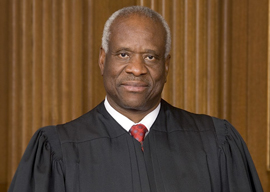
February 15, 2018

Clarence Thomas
Source: Wikimedia Commons
Through diligent and persistent police interrogation it was then determined that “Peaches” and “Tasty” were actually two names for the same person. The Supreme Court, in its wisdom, chose to use “Peaches” during both oral arguments and written opinions in an effort to dispel ambiguity and because nobody wants to find out why she might be called Tasty.
Through further police persistence, they manage to get Peaches on the phone. Peaches is none too happy to hear from them, refuses to come to the house for fear of arrest, hangs up on them three times, then eventually gives in to the persistent ring of her cell phone and claims that, although the house is not hers, she knows the owner.
Having given up the name of the owner, that guy is contacted and confirms the suspicion of the intrepid lapdance-witnessing officers: Peaches had been negotiating a lease for the property but didn’t have one yet, and she had no permission to use the house.
At this point 21 people were hauled down to the station house on charges of “unlawful entry,” but once there, the lieutenant on duty changed the charge to “disorderly conduct.”
Sixteen of those 21 makeshift-strip-club devotees then sued the District of Columbia for false arrest, saying the cops had no probable cause to detain them since how could they possibly know that Peaches was a liar?
The district court agreed and awarded them $680,000 in damages plus attorneys’ fees, bringing the bill to around a million.
The appeals court affirmed that decision, reasoning that everyone knew about the party and had no reason to think someone was occupying a house that didn’t belong to them.
But police officers are supposed to have immunity if they can reasonably assume that a crime is being committed, even if it’s later proved that no crime was committed. So the question becomes: What crime did they think was being committed?
Marijuana? Smoke but no fire.
Lapdancing? Legal.
Nudity in a private home? Legal.
Loud music? At best a misdemeanor.
The eight guys upstairs about to get kinky with a nymphomaniac? Available at many area sex clubs.
Prostitution? Yes, maybe, but no prostitution charges were filed.
So eventually this case makes it to the Supreme Court because it goes to the heart of the question of what a cop can do when he just feels something is wrong. And Justice Thomas did a pretty good job of listing all the things that might make a cop nervous:
the condition of the house.
loud music and “raucous” noises.
marijuana.
lapdances.
apparent gangbang in progress.
people running away when the cops show up.
vague answers as to why they were there and who invited them.
bachelor party with no bachelor.
birthday party with no birthday.
only two people who know the identity of Peaches and they’re both strippers working the party.
Peaches herself being nervous, agitated, and evasive.
Decision of the appeals court reversed. Judgment thrown out. The cops did nothing wrong. The Supreme Court has ruled.
The media accounts failed to mention one fact, however. That guy at the window who ran upstairs as soon as the cops arrived?
They never found him.
Who knew about the “debauchery”?
I think Clarence knows his party houses.